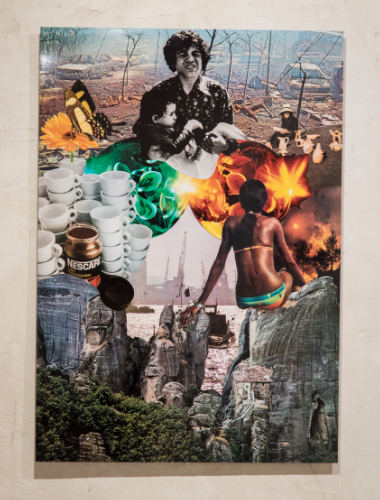

"POETICS IN FREDOOM"
Pedro José Pradillo
26/10/19 - 26/11/19
The selection "Poetics in freedom" belongs to the collection of collages by a young Pedro José Pradillo –made between the ages of 17 and 18–, which, however, is now being exhibited together for the first time –more than forty years later. of its execution. The works, except for two pieces, are not presented in the original version, but as photographic positives on dibond.
The title of the exhibition refers to an adolescent Pedro José who has ceased to be a child to consider himself a mature and conscious man, who is now ready to make his own decisions and express his opinion about the world around him with total freedom, which, in addition It coincides with the national sentiment that emerged after the end of the Franco regime and the liberation that the long-awaited and released democracy is expected to contribute. In addition, it is poetic, since Pedro José is adult enough to make judgments, express his feelings and concerns through allegories in the form of publicity photographs, magazine clippings, etc.
We observe in this collection how it perfectly combines metaphor and symbolism with an explosion of colors and a careful aesthetic, at the same time as shocking. The chromatic richness and social denunciation keep the viewer spellbound and bewildered, searching for the meaning of these disparate photographs that, at first glance, have nothing to do with it, but which as a whole convey a harmonious and, above all, conceptual composition.
The lack of national artistic references for this adolescent creator allows us to consider this collection as a completely unique landmark. Let us remember that these collages began to be composed from 1977, when the young avant-garde men of the “Movida Madrileña” had not yet burst onto the scene. In this way, the only parallelism that we find with these authors would be the nascent need for a counterculture that, little by little, emerged within adolescents during the throes of Francoism.
Specifically, our author looks at American Pop Art and takes as a reference one of its greatest exponents, the expressionist Robert Rauschenberg (1925-2008). The American, many times labeled as Neo Dadaist –current from which Pradillo also drinks–, affirmed that his work was in the open gap between art and life, questioning whether there is a distinction between art and everyday objects. day. This way of understanding the discipline reminds us of the way of working of Pedro José, since his creations are made from everyday elements.
We can therefore consider that our author is a premature and original artist, prior to what was the post-Franco creative explosion personified in the aforementioned “Movida”. Without any doubt, we are facing a new and avant-garde work, which, with only the superposition and combination of photographs, manages to move the viewer.
Regarding the subject, Pedro José, as a son of his time, shows what many people were beginning to question at that time of democratic transition. Thus, the most recurrent issues in the selection are: sexual freedom, the end of the nuclear family as the only legitimate type, the emancipation of women, science and the development of the contemporary era, concern for the environment, disasters of wars and terrorism, heritage conservation ... Despite the difference between the issues, all of them breathe an atmosphere of both hope and concern, since we are in a historical and transcendent stage: Spain, Without even a Constitution and without having yet held general elections, it is opening itself up to democracy in a somewhat precarious way, yes, but with all illusion. Times are changing and the population with them, still not quite sure how.
Text by Gala Pradillo Díaz
.










